Spark Ventures Is on a Children's Crusade

A first grade class in Zambia. All photos courtesy of Spark Ventures.
If you want to help the children of the world — through education, healthcare, and maybe a round of soccer — what do you do? If you're Richard Johnson, CEO of Spark Ventures, you start with a few local partners in Zambia and Nicargua, invite good-natured travelers to join you, and grow from there. Here's his story.
Tell us about your company.
Spark Ventures is a Chicago-based nonprofit with international partnerships that provide children in poverty with nutrition, education, and healthcare.
We partner with grassroots organizations serving children in developing countries. We strengthen and sustain partners by providing human resources, strategic guidance, and financial capital. Together, Spark and its partners launch businesses whose profits ensure meaningful impact for children and their communities for generations to come.
We also take Partnership Trips, unparalleled international volunteer opportunities to see our work in action and connect with the children we serve, as well as the inspiring leadership at our partner organizations.
What inspired you to create Spark?
In May 2006, two friends and I went to Zambia to learn more about the world and get out of our comfort zone. We connected with an organization called Hope Ministries, lead by an amazing local named Charles Mumba. He and his wife were doing all they could to provide a future for vulnerable children in their community — a very poor community, deeply affected by HIV/AIDS.
We spent most of our time at the orphanage and primary school they started. On that first trip, we made a lot of new friends, both with the children and the dedicated staff. The trip raised many questions, but the most important seemed to be: What can we do to make a difference — especially from Chicago?
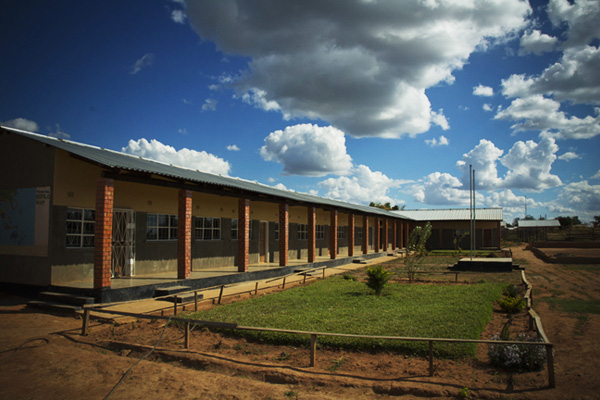
The Hope Community School.
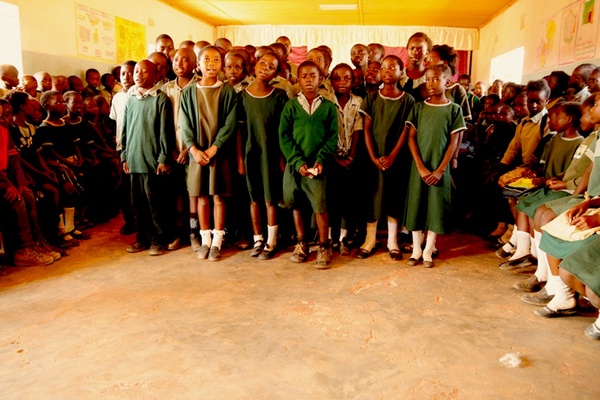
A school portrait.
Who benefits from your work?
The motivation of everything we do at Spark Ventures is the vision of a future where all children have the resources and opportunity they need to achieve their potential. Our partnership in Zambia and our more recent partnership in Nicaragua both focus on providing the essentials of nutrition, education, and healthcare to vulnerable children.
But Spark's approach is a bit nontraditional. We help launch a business that's owned and operated by our international partner, and these businesses create financial sustainability for their child-focused programming. As Charles, the director of our Zambian partner likes to explain it, we come alongside grassroots organizations and help them "stand on their own two feet." These businesses create jobs in their communities and provide goods and services. The result is a strong, locally lead organization that's able to benefit their community for generations to come.
A secondary group of beneficiaries are the volunteers who participate in our Partnership Trips. They have a cross-cultural learning experience that builds their sense of global citizenship.
Did you have any prior personal connections to Zambia or Nicaragua?
Our first trip to Zambia was inspired by a desire to do something dramatically different and see the world from a completely different viewpoint than the one we had as three guys leading comfortable lives in urban Chicago. But once we arrived, it took no time at all to feel right at home. Zambians are incredible hosts, and we were welcomed with open arms. I am still incredibly close with the family that hosted us that first trip. Every time I'm back, I'll go over for dinner. My "Zambian parents" will cook me a dinner (and, oh, what a dinner!) and we'll chat about what's new in my life and in theirs.
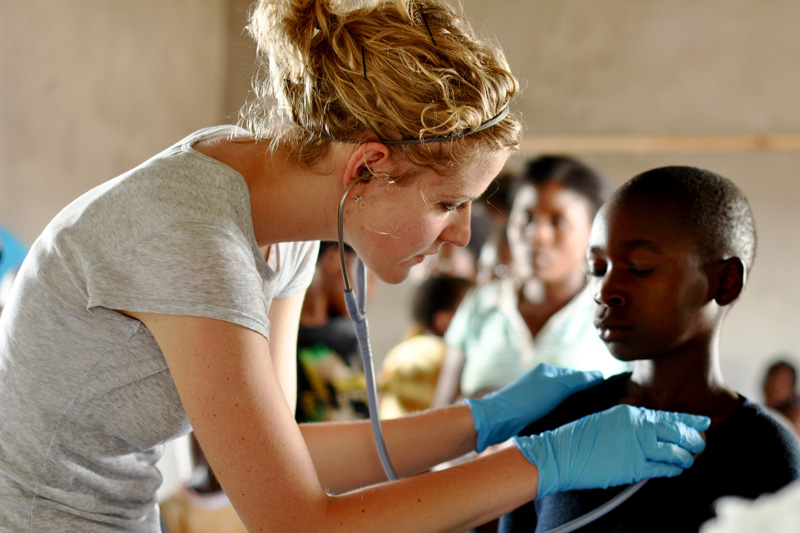
Spark's biannual clinic.
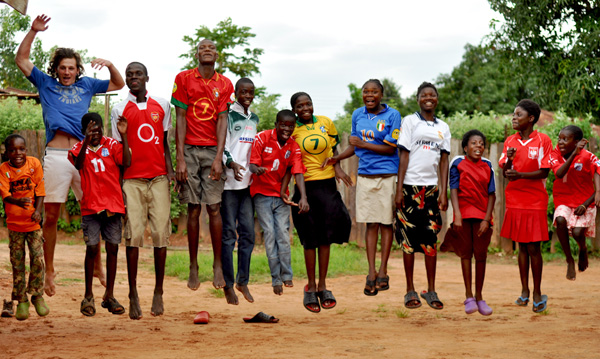
The Spark Ventures soccer team.
What's challenging about working in Zambia and Nicaragua?
Building a startup business anywhere is not a simple task. Doing so in a country like Zambia, which is still struggling with the remnants of colonialism, the shadow of HIV/AIDS, and the impact of 70 percent of its people still living under the poverty line, can be daunting.
Spark's first business investment intended to create financial sustainability was a commercial poultry farm. Since the launch in 2011, the farm has sold more than 40,000 birds and generated a modest profit. Quite an accomplishment for our partners.
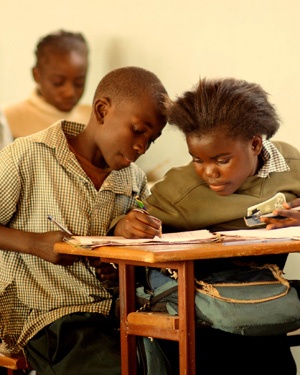
For the team at the farm, the challenges have been plentiful. Land disputes; power outages; stiff competition at the marketplace; a stolen water pump; a wind storm that blew part of the roof off, killing hundreds of chicks; key personnel departures; skyrocketing wood-shaving prices; and a flood. At times, I've wondered how this small business will survive, but just a single board meeting with the leadership reminds me how it will not only survive but also thrive. The women and men on the board of our partner's farm are some of the most resilient people I've met in my life. It was a privilege to sit around the table with them and work through the current challenges and begin to look at future plans and opportunities.
In Nicaragua, where we are just in the initial stages of building a business plan, we face many similar and other new challenges that come with working in Central America's second-poorest country. But in the year we've been working with their leadership, I can already say with confidence that the individuals at the helm of both of our international partners are powerful drivers of good in their communities. I feel proud to be working with them to build better opportunities for the children they serve.
Tell us about a lost-in-translation moment.
Whenever we're on one of our Partnership Trips, bringing volunteers to the field to meet our partners and work with the children, we do our best to pack their days with cultural opportunities so they can truly get to know the countries we work in. On our last trip to Zambia, we happened to have all-female travelers (except me), and the female teachers of the community school decided it would be fun to share traditional Zambian women's dances with our travelers. I was told "no boys allowed," but I was curious and thought it might be okay for me to peek in on them to picture for our travel blog. It was not! I've never been shooed away so quickly! All to the sound of grown women giggling like schoolgirls along with incredible Zambian drumming.
How often do you go on location?
We have trips every quarter to Nicaragua or Zambia, so I'm often helping introduce a new group of people to our partners. After the volunteer travelers leave, I normally stick around to do additional work with our partners. If you count up the stamps in my passport, I've been to Zambia around 15 times since we started Spark Ventures in 2007.
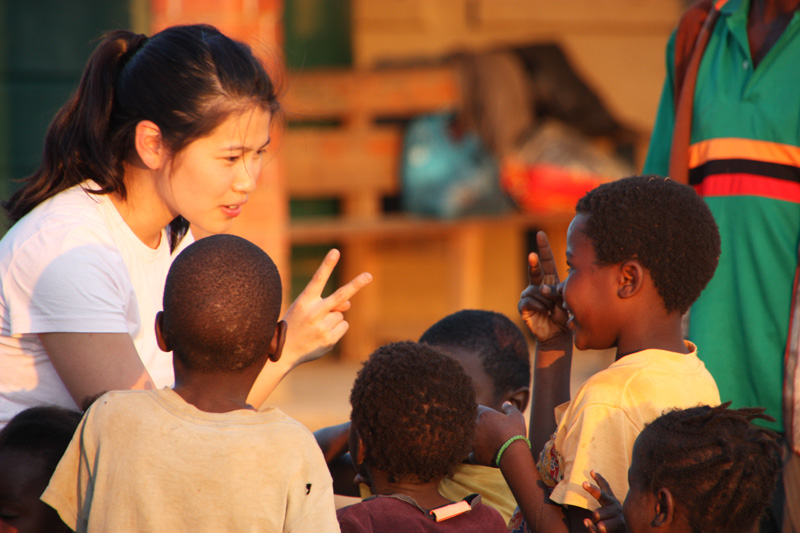
Spark staff with the kids.
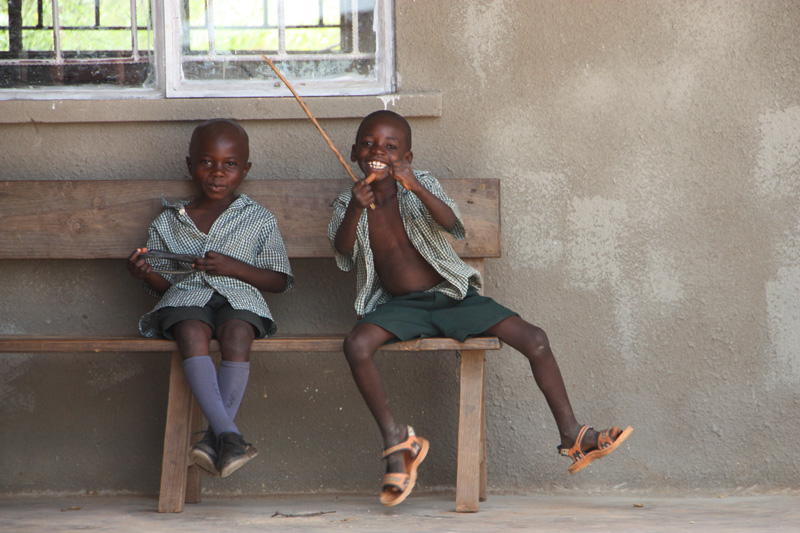
Goofing off after class.
What are your three favorite things to do and see?
In Zambia:
1. Hanging out at Hope Community School with the kids. It's an indescribable feeling to get back to Zambia and see kids I met five years ago, graduated from primary school and growing up to be talented young adults.
2. Victoria Falls and Chobe National Park safari.
3. The craft markets.
In Nicaragua:
1. Look-out over Lake Managua to see the chain of volcanoes
2. Traditional Nicaraguan dinner at Corina's, the founder of Las Tias, our Nicaraguan partner.
3. My best day in Granada involved hiking the crater at Momotombo and a boat tour of the volcanic islands in Lake Nicaragua.
Has working with Spark Ventures changed the way you think about charity and helping others?
Yes. When I first traveled to Zambia with my two friends, we had no intention of starting a nonprofit. I have been humbled by what I have learned from day one. In terms of international philanthropy, I used to think more traditionally — just give more and more every year to help with temporary poverty alleviation. But now I think about things from the point of sustainability and empowerment. That is what Spark's model is attempting to do: Break the cycle of poverty by empowering and sustaining our international partners.
What's your advice for entrepreneurs who want their businesses to have an aspect of global giving?
My favorite African proverb says, "If you want to go fast, go alone. If you want to go far, go together." I would advise entrepreneurs looking to build in global giving to look for local partnerships that can inform your philanthropy. People living and working in the community you hope to serve will be your best resource if you want to have a deep and long-lasting impact.
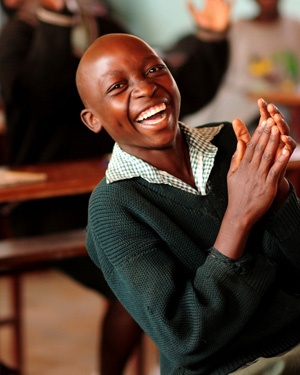
Where do you want your company to be in five years?
Five years from now, we hope to be even farther along on the aggressive growth trajectory our organization has been on for the past five years. We hope to have profitable businesses that are sustaining 100 percent of our Zambian and Nicaraguan partners, as well as two additional international partners added to the portfolio.
Where are you traveling next?
This fall, I'll be in San Francisco, Washington D.C., New York and then back in Nicaragua in October, yet again leading a group of intrepid travelers to see our work up-close and in person, to spend time volunteering with the children we serve, to meet the dedicated staff of our partner organization there, and to be inspired by beautiful and generous Nicaragua. You should join us for a trip!
GET INVOLVED
Spark Ventures's volunteer trips for 2014 will go to Zambia in January and July and Nicaragua in April.
MORE ON FATHOM
Giving Back: Runa Amazing Energy Drinks
Giving Back: Bridge the Gap Villages, Fiji
Giving Back: Katharine L'Heureux for Kahina Giving Beauty
